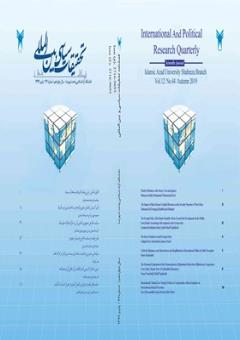The effect of membership in regional organizations on trade development and reducing the effect of sanctions A case study of Iran and the Eurasian Economic Union
Subject Areas : Political Sciences- International Relationsseyyed nasroallahe hejazi 1 , aboalghasem shahriari 2 , fahimeh asgarabadi 3
1 - Department of Political Science, Hakim Sabzevari University, Sabzevar, Iran.
2 - FERDOWSI UNI
3 - Department of Political Science, Ferdowsi University of Mashhad
Keywords: Iran, Eurasian Economic Union, economic entanglement, sanctions, time series.,
Abstract :
Diversification of products and business partners are two ways to reduce the effect of sanctions,and the review ofthe 2018sanctions against Iran indicates that relying on oil-based products is the most important reason for Iran's vulnerability to sanctions,which has also led to the reduction of Iran's business partners.The development of export products andthe effort to create a multi-axis in business partners is an alternative theory of sanctions,which has been proposed under the title of economic entanglement.The Eurasian Economic Union is oneof the economic organizations that has the necessary potential to develop Iran's trade during the sanctions period.The purpose of the research is to investigate the effect of Iran's trade agreement with this union on the development of Iran's trade,which was done using the time series method.Has had a significant upward trend and the share of Iran's imports has been stable,and considering the major contribution of non-oil products in promoting Iran's exports to Eurasia,the importance ofthe trade agreement is confirmed. Considering the existence of a joint agreement between this union and other countries that were part of Iran's main partners before the sanctions were considered, the implementation of the permanent agreement between Iran and the Eurasian Economic Union will expand Iran's trade.
انصارینسب، مسلم؛ بیدمال، نجمه (1401)، «راهبرد توسعه تجاری ایران-اتحادیه اقتصادی اوراسیا»، مطالعات آسیای مرکزی و قفقاز، 118 (2)، 86-61.
بلاغی اینالو، یاسر؛ نجاتی، مهدی؛ بهمنی، مجتبی؛ جلایی اسفندآبادی، سیدعبدالمجید (1401)، «ﻣﻨﺎﻓﻊ اﻗﺘﺼﺎدی اﻳﺮان از ﮔﺴﺘﺮش رواﺑﻂ ﺗﺠﺎری ﺑﺎ اتحادیه اقتصادی اوراسیا: رویکرد GDyn»، نظریههای کاربردی اقتصاد، 9 (1)، 26-1.
خرمی، مصطفی (1386)، تجزیهوتحلیل سریهای زمانی با نرمافزار MINITAB 14، مشهد: سخنگستر.
راسخی، سعید؛ ساعدی، رؤیا؛ حسینی، سیدعباس (1399)، «ارزیابی تراز اقلام امتیازی توافقنامۀ ایجاد ترتیبات تجارت آزاد بین ایران و اتحادیۀ اقتصادی اوراسیا»، سیاست و روابط بینالملل، 4 (7)، 110-80.
سیمبر، رضا؛ غلامنیا، هادی (1400)، «دیپلماسی اقتصادی جمهوری اسلامی ایران با اتحادیه اقتصادی اوراسیا (مطالعه موردی همکاریهای تعرفهای)»، مطالعات آسیای مرکزی و قفقاز، 113 (1)، 20-1.
عباسی خوشکار، امیر (1398)، «راهبرد سیاست همسایگی و نظمسازی ژئواکونومیکی چندجانبه؛ جمهوری اسلامی ایران و اتحادیه اقتصادی اوراسیا»، سازمانهای بینالمللی، 15 (2)، 216-198.
عسگری، منصور (1398)، «عوامل مؤثر بر صادرات ایران به اتحادیه اقتصادی اوراسیا»، مدلسازی اقتصادی، 47(3)، 102-77.
طالبپور، سمیه؛ نورایی، محمود؛ محمدپور، رضا (1401)، «نقش اتحادیه اقتصادی اوراسیا در توسعه تجارت خارجی ایران»، پژوهشهای جغرافیای سیاسی، 27 (1)، 140-119.
کاظمنژاد، مهدی، عزیزی، لیلا؛ حسینی امین، سیده زهره (1400)، «تأثیر موافقتنامه موقت ایران و اتحادیه اقتصادی اوراسیا در توسعه تجارت بین این کشورها»، اقتصاد کشاورزی، 15 (4)، 93-61.
مرادی حقیقی، فائزه؛ نصیرزاد، مهران؛ حسینی، میرعبداله (1402)، «منطقهگرایی ایران با سازمان همکاری شانگهای در مقایسه با اتحادیه اقتصادی اوراسیا»، مطالعات اقتصاد سیاسی بینالملل، 6 (1)، 288-259.
مهکویی، حجت؛ گودرزی، مهناز (1398)، «تأثیر اتحادیۀ اقتصادی اوراسیا بر موقعیت ژئواکونومیک جمهوری اسلامی ایران»، مطالعات اوراسیای مرکزی، 12 (2)، 538-519.
نجاتی، مهدی؛ بهمنی، مجتبی؛ جلایی اسفندآبادی، سیدعبدالمجید؛ بلاغی اینالو، یاسر (1401)، «اثرات آزادسازی تجاری در فعالیتهای بخش صنعت ایران و اتحادیه اقتصادی اوراسیا: رهیافت GTAP»، اقتصاد کلان، 33 (1)، 34-10.
نقیبزاده، احمد؛ برزگر، کیهان؛ رستمآقایی، علیرضا؛ قوام، عبدالعلی (1401)، «رویکرد سازه انگارانه به فرهنگ استراتژیک روسیه و ایران در جغرافیای سیاسی اوراسیا تأثیر آن بر منافع ملی ایران»، جغرافیا، 12 (2)، 52-31.
ویسی، هادی (1400)، «اتحادیه اقتصادی اوراسیایی و منطقهگرایی ایران»، مطالعات اوراسیای مرکزی، 14 (1)، 400-380.
Adarov, Amat and Ghodsi, Mahdi (2021), The impact of the Eurasian Economic Union–Iran preferential trade agreement on mutual trade at aggregate and sectoral levels, Eurasian Economic Review, 11 (1), 125-157.
Andermo, Erik and Kragh, Martin. (2021). Sanctions and Dollar Dependency in Russia: Resilience, Vulnerability, and Financial Integration, Review of International Post Soviet Affairs, 37 (3), 276–301.
Brandt, Patric and Freeman, John (2006). Advances in Bayesian Time Series Modeling and the Study of Politics: Theory Testing, Forecasting, and Policy Analysis. Political Analysis, 14 (1), 1-36.
Davis, Stuart. (2023). Sanctions as war: anti-imperialist perspectives on American geo-economic, Published by Hayamarket Books.
Dettling, Marc (2020). Applied Time Series Analysis, Institute for Data Analysis and Process Design, Zurich University.
Garzarelli, Giampaolo and Galli, Emma (2020) The Political Red Queen, Journal of Public Finance and Public Choice, 35 (1): 141-160. DOI: 10.1332/251569120X15920660557733
Garzarelli, Giampaolo. Keeton, Lyndal and Sitoe, Aldo (2023), Duality, Liberty, and Realism in Entangled Political Economy, IN, Realism, Ideology, and the Convulsions of Democracy, DOI: 10.1007/978-3-031-39458-4_2
Hatami, Touraj. Zargar, Afshin and Amin, Armin (2020), Iran and Eurasian Economic Union, Iranian Review of Foreign Affairs, 11 (1), 277-301.
Koppl, Roger (2014), Introduction to “Entangled Political Economy”, Austrian Economics, 18 (1): 1-18. DOI: 10.1108/S1529-213420140000018001
Mekhdiev, Elnur. Sokolova, Elizaveta. Toropova, Natalia and Guliev, Igbal (2023), Eurasian Economic Union – Iran Partnership on Bilateral and Multilateral Basis: Economic and Geopolitical Aspects, Geopolitics, 19 (2), 91-107. DOI: 20.1001.1.17354331.1402.19.70.5.8
Maymin, Philip (2014), A New Algorithmic Approach to Entangled Political Economy: Insights from the Simplest Models of Complexity, Austrian Economics, 18 (1): 213-236. DOI: 10.1108/S1529-213420140000018010
Paganelli, Maria Pia (2014), Adam Smith and Entangled Political Economy, Austrian Economics, 18 (1): 37-54. DOI: 10.1108/S1529-213420140000018010
Shagina, Maria. (2022). Western financial warfare and Russia’s de-dollarization strategy: How sanctions on Russia might reshape the global financial system, FIIA Briefing Paper, No: 339.
Wagner, Richard (2012), A Macro Economy as an Emergent Ecology of Plans, Journal of Economic Behavior and Organization, 82 (3): 433-444. DOI: 10.1016/j.jebo.2011.07.019
Wagner, Richard (2016), Governance within a system of entangled political economy, Forest Policy and Economics, 107 (3): 1-7. DOI: 10.1016/j.forpol.2019.05.004
Wagner, Richard (2019), Politics as a Peculiar Business: Insights from a Theory of Entangled Political Economy, Cheltenham, UK: Edward Elgar.
Weakliem, David (2010). Time Series Analysis of Political Change. In: Handbook of Politics. Handbooks of Sociology and Social Research. Springer, New York.
World Bank (2021), Access at: wits.worldbank.org


